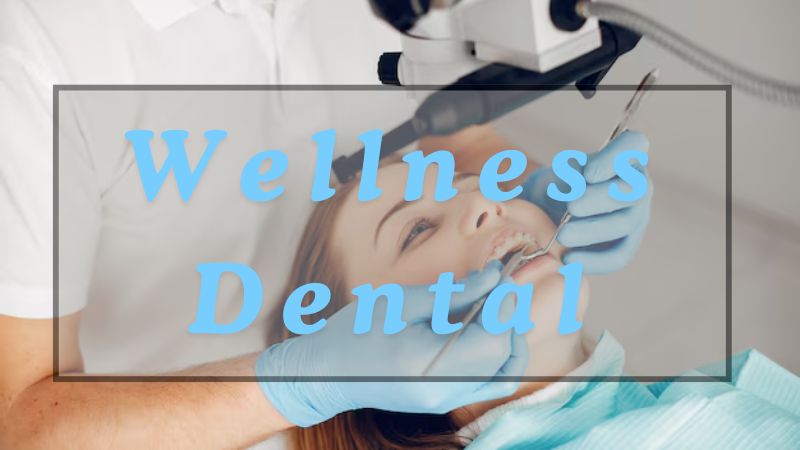Definition of Wellness Dental
Wellness dental refers to a comprehensive approach to oral health that emphasizes prevention, early detection, and treatment of dental issues, integrating overall health and well-being into dental care practices. It includes preventive, restorative, cosmetic, and holistic dental care to ensure optimal oral health.
Relevance and Importance
Oral health is a critical component of overall health. Wellness dental practices not only prevent dental diseases but also improve the quality of life by ensuring a healthy mouth, which is essential for speaking, eating, and overall well-being. Poor oral health can lead to systemic health issues, making it imperative to adopt a wellness dental approach.

Types and Categories of Wellness Dental
Preventive Dental Care
Preventive dental care focuses on maintaining healthy teeth and gums and preventing dental issues before they develop. This includes regular dental check-ups, cleanings, fluoride treatments, sealants, and patient education on proper oral hygiene practices.
Restorative Dental Care
Restorative dental care aims to repair damaged or decayed teeth and restore the function and appearance of the mouth. Common restorative treatments include fillings, crowns, bridges, dentures, and dental implants.
Cosmetic Dental Care
Cosmetic dental care is focused on improving the appearance of the teeth and smile. This includes procedures such as teeth whitening, veneers, bonding, and orthodontics. Cosmetic dentistry enhances self-esteem and confidence by addressing aesthetic concerns.
Holistic Dental Care
Holistic dental care, also known as biological dentistry, considers the impact of dental treatments on the overall health of the body. It emphasizes natural and minimally invasive procedures, often using biocompatible materials and alternative treatments.
Symptoms and Signs
Common Dental Issues
Common dental issues include tooth decay, gum disease (gingivitis and periodontitis), tooth sensitivity, bad breath (halitosis), and oral infections. Recognizing these issues early can prevent more severe problems.
Indicators of Dental Problems
Indicators of dental problems include pain or discomfort, bleeding gums, persistent bad breath, loose teeth, and visible changes in the teeth or gums. Early detection of these signs is crucial for effective treatment and prevention of further complications.
Causes and Risk Factors
Biological Factors
Biological factors such as genetics, age, and hormonal changes can influence dental health. Genetic predispositions can make some individuals more susceptible to tooth decay and gum disease, while age and hormonal changes can impact oral health over time.
Environmental Factors
Environmental factors include exposure to fluoride, availability of dental care, and socioeconomic status. Lack of access to dental care and fluoride can increase the risk of dental problems.
Lifestyle Factors
Lifestyle factors such as diet, smoking, alcohol consumption, and oral hygiene practices play a significant role in dental health. A diet high in sugar and acidic foods, poor oral hygiene, and habits like smoking can contribute to dental issues.
Diagnosis and Tests
Common Diagnostic Tools
Common diagnostic tools in dentistry include dental X-rays, oral exams, and periodontal assessments. These tools help detect cavities, gum disease, and other oral health issues early.
Advanced Dental Testing
Advanced dental testing includes digital imaging, intraoral cameras, and laser diagnostics. These technologies provide detailed images and data, allowing for more accurate diagnosis and treatment planning.
Treatment Options
Preventive Treatments
Preventive treatments include dental cleanings, fluoride treatments, sealants, and patient education on proper oral hygiene. These measures help prevent cavities, gum disease, and other dental issues.
Restorative Treatments
Restorative treatments involve procedures like fillings, crowns, bridges, dentures, and dental implants. These treatments repair damaged or decayed teeth and restore oral function.
Cosmetic Treatments
Cosmetic treatments include teeth whitening, veneers, bonding, and orthodontics. These procedures enhance the appearance of the teeth and smile, boosting confidence and self-esteem.
Holistic Treatments
Holistic treatments focus on natural and minimally invasive procedures, often using biocompatible materials and alternative therapies. This approach aims to maintain overall health and wellness while treating dental issues.
Preventive Measures
Daily Oral Hygiene
Daily oral hygiene practices include brushing teeth at least twice a day, flossing, and using mouthwash. Proper oral hygiene helps remove plaque, prevent cavities, and maintain healthy gums.
Regular Dental Check-Ups
Regular dental check-ups, ideally every six months, are essential for maintaining oral health. These visits allow for professional cleanings and early detection of dental problems.
Dietary Considerations
A balanced diet that is low in sugar and acidic foods helps maintain dental health. Consuming foods rich in calcium, vitamins, and minerals supports strong teeth and gums.
Lifestyle Habits
Healthy lifestyle habits such as avoiding smoking, limiting alcohol consumption, and managing stress contribute to overall dental health. These habits help prevent dental issues and support general well-being.
Personal Stories or Case Studies
Success Stories of Preventive Care
Personal stories of individuals who have maintained excellent oral health through preventive care highlight the importance of regular dental check-ups and proper oral hygiene practices.
Restorative Care Transformations
Case studies of individuals who have undergone restorative treatments, such as dental implants or crowns, showcase the life-changing impact of restoring oral function and aesthetics.
Cosmetic Dental Improvements
Stories of people who have enhanced their smiles through cosmetic dentistry, such as teeth whitening or veneers, illustrate the boost in confidence and self-esteem that comes with a beautiful smile.
Holistic Dental Health Journeys
Accounts of patients who have pursued holistic dental care emphasize the benefits of a natural and integrated approach to oral health, highlighting the connection between dental treatments and overall wellness.
Expert Insights
Quotes from Dentists
Dentists provide valuable insights into the importance of preventive care, the latest advancements in dental treatments, and tips for maintaining oral health.
Tips from Dental Hygienists
Dental hygienists share practical advice on proper brushing and flossing techniques, the best oral care products, and ways to maintain a healthy mouth.
Insights from Orthodontists
Orthodontists offer perspectives on the benefits of orthodontic treatments, the latest technologies in braces and aligners, and tips for maintaining oral health during orthodontic care.
Perspectives from Holistic Dentists
Holistic dentists discuss the principles of biological dentistry, the benefits of using biocompatible materials, and the importance of considering overall health in dental treatments.
Conclusion
Summary of Key Points
Wellness dental encompasses a comprehensive approach to oral health, focusing on preventive, restorative, cosmetic, and holistic care. Recognizing the symptoms and signs of dental issues, understanding the causes and risk factors, and pursuing appropriate treatments are essential for maintaining optimal oral health.
Call to Action for Further Education
To achieve and maintain wellness dental health, it is crucial to stay informed and proactive. Regular dental check-ups, proper oral hygiene, healthy lifestyle choices, and seeking expert advice are vital steps in ensuring a healthy mouth and overall well-being.



